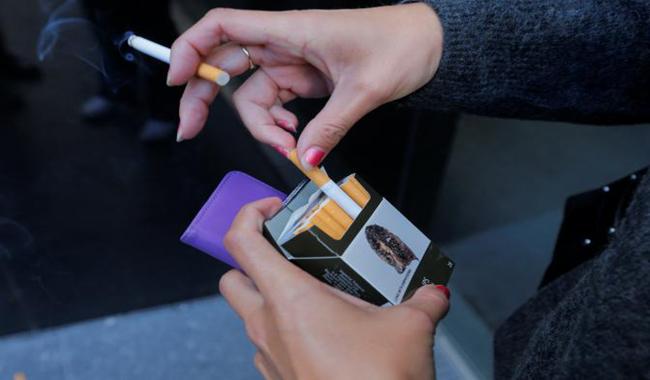A landmark Australian law on restrictive tobacco packaging has been upheld at the World Trade Organization after a five-year legal battle, Bloomberg news reported on Thursday, citing two people familiar with the situation.
The news is a blow to the tobacco industry as such a ruling from the WTO has been widely anticipated as giving a green light for other countries to roll out similar laws.
It could have wider implications if applied to packaging for alcohol and junk food.
The Australian law goes much further than advertising bans and graphic health warnings enforced in many other countries.
The rules, introduced in 2010, ban logos and distinctive-colored cigarette packaging in favor of drab olive packets that look more like military or prison issue, with brand names printed in small standardized fonts.
Tobacco firms said their trademarks were being infringed, and Cuba, Honduras, Dominican Republic and Indonesia complained at the WTO that the rules constituted an illegal barrier to trade.
Although the WTO's final ruling is not expected until July, a confidential draft said Australia's laws were a legitimate public health measure, Bloomberg reported.
A WTO official confirmed the draft was sent to parties to the dispute on Tuesday. "It's a confidential interim report ... and we don't comment on confidential reports," he said.
Of the biggest international cigarette companies, Imperial Brands' profits are most exposed to markets that may implement plain packaging, said analysts at Jefferies.
Imperial's shares fell more than 2 percent, while Philip Morris and British American Tobacco were up slightly.
A spokeswoman for British American declined to comment on the ruling until it was made public, but suggested the complainants would keep fighting.
"As there is a high likelihood of an appeal by some or all of the parties, it's important to note that this panel report is not the final word on whether plain packaging is consistent with international law," she said.
A spokeswoman for Japan Tobacco also declined to comment on the ruling, but said the fact that the draft had been leaked was disconcerting and a breach of WTO rules.
"Such breaches completely undermine the integrity of the process, which has not yet run its full course," she said.
A spokesman for Imperial declined to comment and Philip Morris, the world leader, was not immediately available.
DOMINO EFFECT?
The plodding pace of WTO decision-making prompted Australia, which had the backing of the World Health Organization, to complain that its challengers were deliberately stalling the proceedings, producing a "regulatory chilling" effect on other countries wishing to follow its example.
But since the challenge was made, many other countries began exploring similar legislation, a sign that they expected the WTO to rule in Australia's favor.
Britain, France and Hungary have gone ahead with their own legislation, while Ireland, Canada, South Africa, New Zealand and Belgium are among those considering it.
Imperial Brands CEO Alison Cooper told reporters on Wednesday that she did not expect "a particularly significant domino effect in terms of different markets adopting it".
But Jefferies analysts said on Thursday that an Australian victory at the WTO would give other countries confidence they could successfully pass similar measures, which could lead to more action.
The key risk for investors is that disappearing brand equity will erode pricing power, which is critical for sales and profit growth in a market that is shrinking as more people quit the deadly habit. In addition, plain packaging opens the door to newer, cheaper rivals.
Big tobacco companies have argued that the impact of plain packaging in Australia can not be adequately discerned from the effect of a large excise tax increase. They also say it will lead to growth of the illicit tobacco trade, partly because plain packs are easier to counterfeit.

Comments
Post a Comment